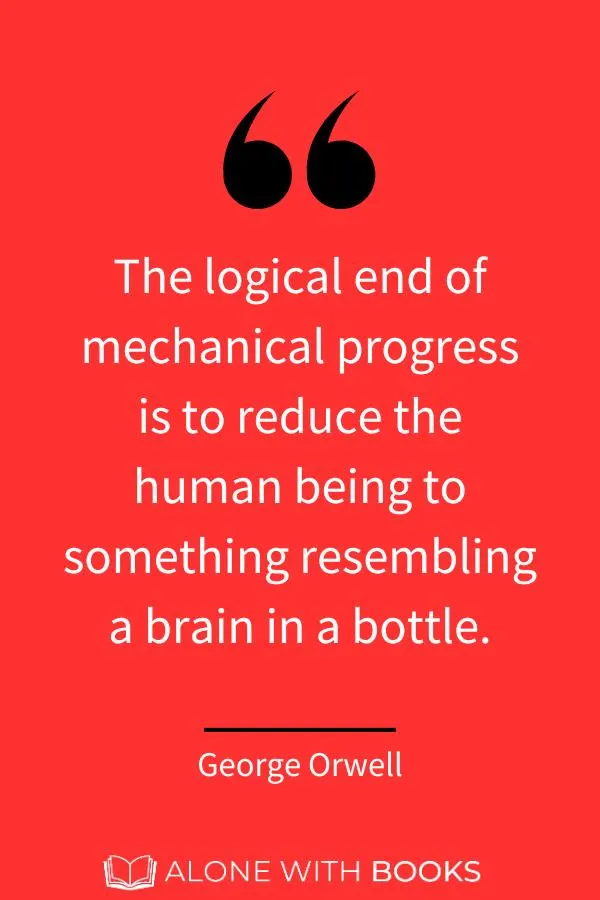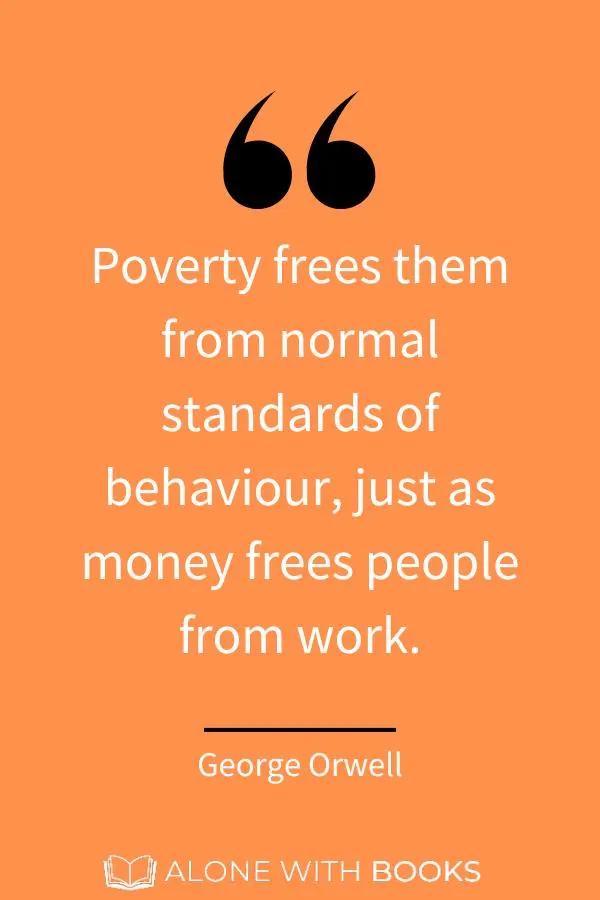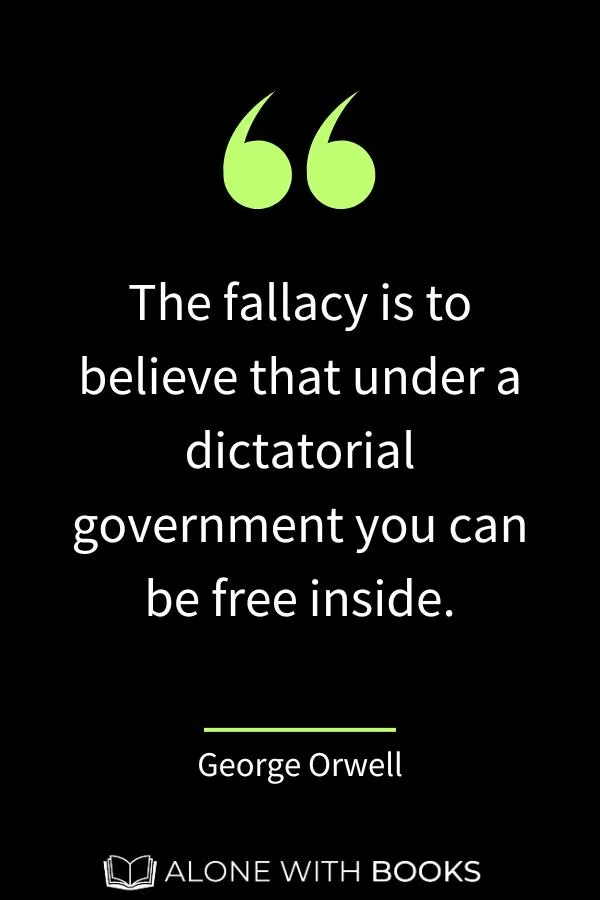This collection of George Orwell quotes is what you should read if you want to get a quick overview of the famous English writer’s work.
Orwell is famous for novels such as Animal Farm and Nineteen Eighty-Four, but he also wrote several other books and many more articles.
You’ll find many famous George Orwell quotes below that relate to politics, truth and many other topics.
Not many writers have a category of literature named after them. If you want to understand why the term Orwellian is applied to some of his works, then the quotes below will give you a few clues!
Table of Contents
George Orwell Quotes
“As I write, highly civilized human beings are flying overhead, trying to kill me.” – From The Lion and The Unicorn

“It was a bright cold day in April, and the clocks were striking thirteen.” – From Nineteen Eighty-Four
If liberty means anything at all, it means the right to tell people what they do not want to hear.” – From the preface of Animal Farm
“From the totalitarian point of view history is something to be created rather than learned. A totalitarian state is in effect a theocracy, and its ruling caste, in order to keep its position, has to be thought of as infallible. But since, in practice, no one is infallible, it is frequently necessary to rearrange past events in order to show that this or that mistake was not made, or that this or that imaginary triumph actually happened.” – From Books v Cigarettes
“Nothing was your own except the few cubic centimetres inside your skull.” – From Nineteen Eighty-Four
“Serenity is impossible to a poor man in a cold country.” – From a review of Hunger and Love
“The goose-step, for instance, is one of the most horrible sights in the world, far more terrifying than a dive-bomber. It is simply an affirmation of naked power; contained in it, quite consciously and intentionally, is the vision of a boot crashing down on a face.” – From The Lion and The Unicorn
“Spending the night out of doors has nothing attractive about it in London, especially for a poor, ragged, undernourished wretch.” – From Beggars in London
“Autobiography is only to be trusted when it reveals something disgraceful. A man who gives a good account of himself is probably lying, since any life when viewed from the inside is simply a series of defeats.” – From “Benefit of Clergy”
“The logical end of mechanical progress is to reduce the human being to something resembling a brain in a bottle.” – From The Road to Wigan Pier

“When one sees highly educated men looking on indifferently at oppression and persecution, one wonders which to despise more, their cynicism or their shortsightedness.” – From Books v Cigarettes
“This man was not dying, he was alive just as we were alive. All the organs of his body were working – bowels digesting food, skin renewing itself, nails growing, tissues forming – all toiling away in solemn foolery. His nails would still be growing when he stood on the drop, when he was falling through the air with a tenth of a second to live. His eyes saw the yellow gravel and the grey walls, and his brain still remembered, foresaw, reasoned – reasoned even about puddles.” – From “A Hanging“
“Threats to freedom of speech, writing and action, though often trivial in isolation, are cumulative in their effect and, unless checked, lead to a general disrespect for the rights of the citizen.” – From “The Freedom Defence Committee”
“You discover boredom and mean complications and the beginnings of hunger, but you also discover the great redeeming feature of poverty: the fact that it annihilates the future.” – From Down and Out in London and Paris
“The ideal set up by the Party was something huge, terrible, and glittering — a world of steel and concrete, of monstrous machines and terrifying weapons — a nation of warriors and fanatics, marching forward in perfect unity, all thinking the same thoughts and shouting the same slogans, perpetually working, fighting, triumphing, persecuting — three hundred million people all with the same face.” – From Nineteen Eighty-Four
“Each generation imagines itself to be more intelligent than the one that went before it, and wiser than the one that comes after it.” – From a review of A Coat of Many Colours: Occasional Essays
“If a man cannot enjoy the return of spring, why should he be happy in a labour-saving utopia? What will he do with the leisure that the machine will give him?” – From Some Thoughts on The Common Toad
“And if our book consumption remains as low as it has been, at least let us admit that it is because reading is a less exciting pastime than going to the dogs, the pictures or the pub, and not because books, whether bought or borrowed, are too expensive.” – From Books v Cigarettes
“Weak or strong, clever or simple, we are all brothers. No animal must ever kill any other animal. All animals are equal.” – From Animal Farm
“Poverty frees them from normal standards of behaviour, just as money frees people from work.” – From Down and Out in London and Paris

“Beauty is meaningless until it is shared.” – From Burmese Days
“Freedom is the freedom to say that two plus two make four. If that is granted, all else follows.” – From Nineteen Eighty-Four
“I have noticed that people who let lodgings nearly always hate their lodgers.” – From The Road to Wigan Pier
“Nationalism is power-hunger tempered by self-deception.” – From Notes on Nationalism
“All animals are equal, but some animals are more equal than others.” – From Animal Farm
The world is a raft sailing through space with, potentially, plenty of provisions for everybody; the idea that we must all cooperate and see to it that everyone does his fair share of the work and gets his fair share of the provisions seems so blatantly obvious that one would say that no one could possibly fail to accept it unless he had some corrupt motive for clinging to the present system.” – From The Road to Wigan Pier
“If you have no money, men won’t care for you, women won’t love you; won’t, that is, care for you or love you the last little bit that matters.” – From Keep the Aspidistra Flying
“I have the most evil memories of Spain, but I have very few bad memories of Spaniards.” – From Homage to Catalonia
“A thousand influences constantly press a working man down into a passive role. He does not act, he is acted upon.” – From The Road to Wigan Pier
“The fallacy is to believe that under a dictatorial government you can be free inside.” – From As I Please

“The nationalist not only does not disapprove of atrocities committed by his own side, but he has a remarkable capacity for not even hearing about them.” – From Notes on Nationalism
“Saints should always be judged guilty until they are proved innocent, but the tests that have to be applied to them are not, of course, the same in all cases.” – From Reflections on Gandhi
“But if thought corrupts language, language can also corrupt thought. A bad usage can spread by tradition and imitation even among people who should and do know better.” – From Politics and the English Language
“It is curious how seldom the all-importance of food is recognized.” – From The Road to Wigan Pier
“And it was at this moment, as I stood there with the rifle in my hands, that I first grasped the hollowness, the futility of the white man’s dominion in the East. Here was I, the white man with his gun, standing in front of the unarmed native crowd – seemingly the leading actor of the piece; but in reality I was only an absurd puppet pushed to and fro by the will of those yellow faces behind. I perceived in this moment that when the white man turns tyrant it is his own freedom that he destroys.” – From “Shooting An Elephant“
“It is a mysterious thing, the loss of faith-as mysterious as faith itself. Like faith, it is ultimately not rooted in logic; it is a change in the climate of the mind.” – From A Clergyman’s Daughter
“One is almost driven to the cynical conclusion that men are only decent when they are powerless.” – From Review of The Freedom of the Streets
“The past is a curious thing. It’s with you all the time. I suppose an hour never passes without your thinking of things that happened ten or twenty years ago, and yet most of the time it’s got no reality, it’s just a set of facts that you’ve learned, like a lot of stuff in a history book. Then some chance sight or sound or smell, especially smell, sets you going, and the past doesn’t merely come back to you, you’re actually in the past.” – From Coming Up For Air
“Society has always to demand a little more from human beings than it will get in practice.” – From “The Art of Donald McGill“
“Thus, for example, tanks, battleships and bombing planes are inherently tyrannical weapons, while rifles, muskets, long-bows, and hand-grenades are inherently democratic weapons. A complex weapon makes the strong stronger, while a simple weapon — so long as there is no answer to it — gives claws to the weak.” – From “You and the Atom Bomb“
“The whole idea of revenge and punishment is a childish day-dream. Properly speaking, there is no such thing as revenge. Revenge is an act which you want to commit when you are powerless and because you are powerless: as soon as the sense of impotence is removed, the desire evaporates also.” – From “Revenge Is Sour“
“Writing a book is a horrible, exhausting struggle, like a long bout of some painful illness. One would never undertake such a thing if one were not driven on by some demon whom one can neither resist nor understand.” – From Why I Write
“To see what is in front of one’s nose needs a constant struggle.” – From “In Front of Your Nose”
“A tragic situation exists precisely when virtue does not triumph but when it is still felt that man is nobler than the forces which destroy him.” – From “Lear, Tolstoy and the Fool”
“No one can look back on his schooldays and say with truth that they were altogether unhappy.” – From “Such, Such Were The Joys“
“No rich man ever succeeds in disguising himself as a poor man; for money, like murder, will out.” – From Keep The Aspidistra Flying
“There are occasions when it pays better to fight and be beaten than not to fight at all.” – From “Charles Dickens“
“War is the greatest of all agents of change. It speeds up all processes, wipes out minor distinctions, brings realities to the surface.” – From “The Lion and The Unicorn”
“To admit that an opponent might be both honest and intelligent is felt to be intolerable. It is more immediately satisfying to shout that he is a fool or a scoundrel, or both, than to find out what he is really like.” – From “As I Please,” Tribune (8 December 1944)
“A society becomes totalitarian when its structure becomes flagrantly artificial: that is, when its ruling class has lost its function but succeeds in clinging to power by force or fraud.” – From “The Prevention of Literature”
You Might Also Like
Animal Farm Quotes – If you’re looking for more quotes from one of Orwell’s most famous books, you’ll find them here.
Nineteen Eighty-Four Quotes – A collection from Orwell’s dystopian novel about totalitarian governments.
